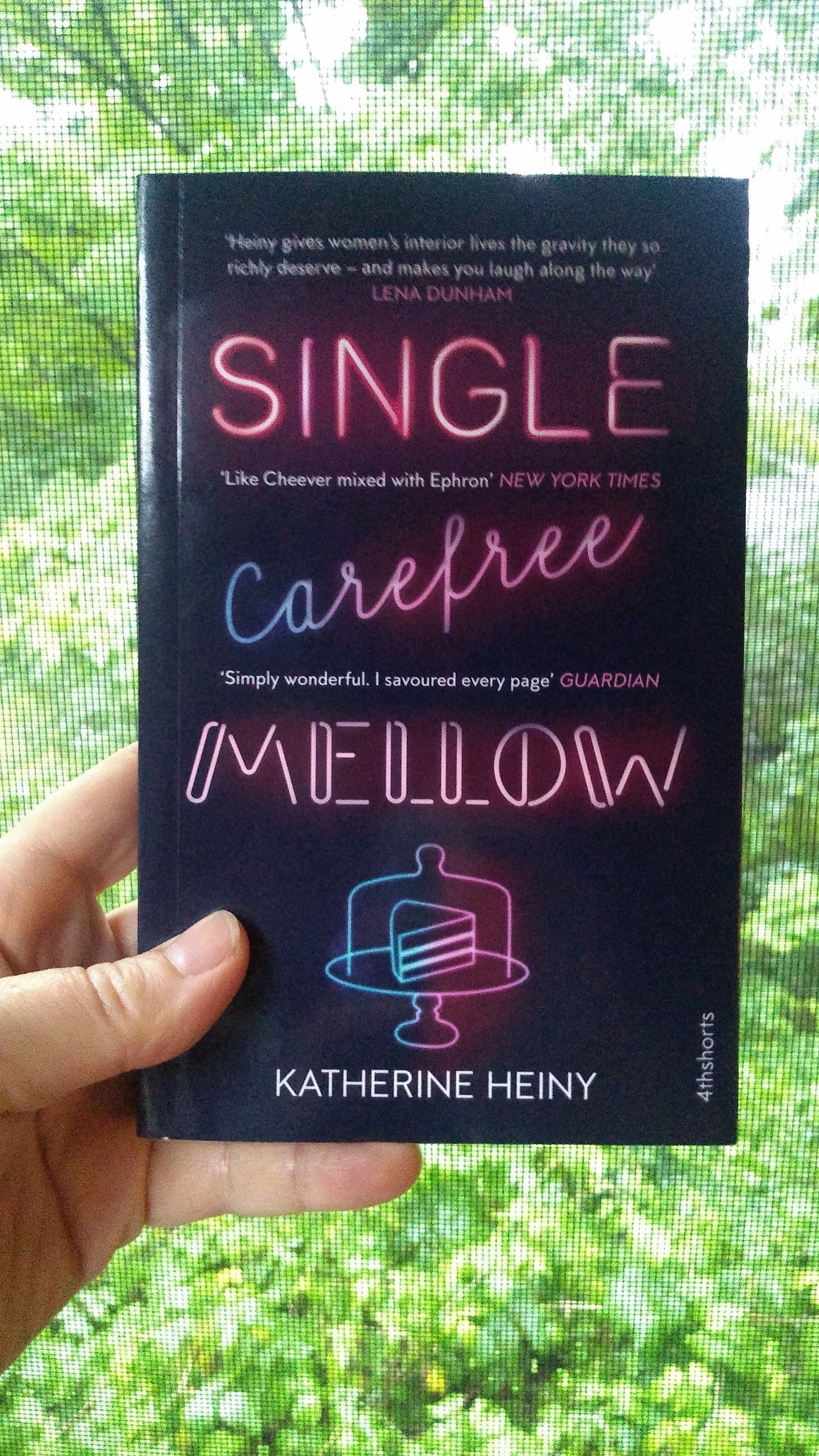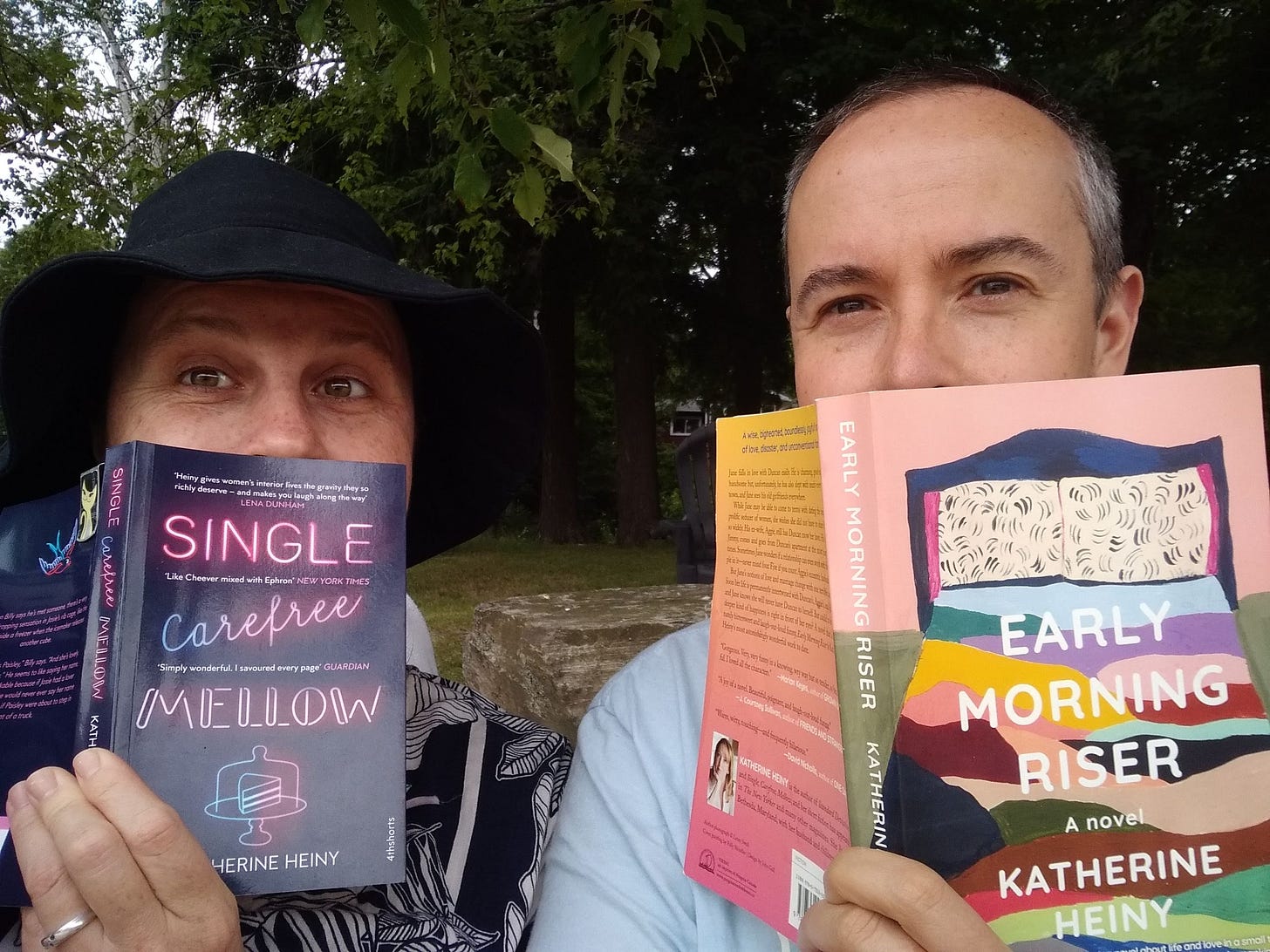Katherine Heiny Gave Me Permission
On what's possible, crowded worlds, no limits, and being on the (human) spectrum.
“It might seem as though it would be difficult to summon the moral fortitude to have an extramarital affair when a minister was living above your garage, but Nina had discovered that almost anything was possible.”—"Blue Heron Bridge”
I tumbled into love with Katherine Heiny’s fiction the way that characters fall in love within Katherine Heiny’s fiction, wholeheartedly, inexplicably, and it coloured the world in a whole new way, like soft stripes in sherbet, like a sunset. Which meant a lot, because it was 2021, and at that time what was standing in for reasons to keep going was faux-jaunty morning walks, looking at other people’s bread on Instagram, and desperate cries for help in the form of children’s rainbow drawings taped to windows a year before, images now so faded they could scarcely be seen.
I’d registered for a Zoom event, which is saying something, because I got vaccinated during the pandemic more often than I ever went to a Zoom event out of my own free will (although it’s fair to say that I got vaccinated a lot). But a Zoom event held by a Washington D.C. bookstore celebrating the launch of a brand new edition of Happy All The Time by the late Laurie Colwin seemed worth going out of my way for, so I did, and Katherine Heiny was the co-host, which is mostly the only thing I remember about that event, and not long after, I borrowed Heiny’s novel Standard Deviation from the library, and nothing was ever the same.
I tumbled into love with Katherine Heiny’s fiction the way that characters fall in love within Katherine Heiny’s fiction, wholeheartedly, inexplicably, and it coloured the world in a whole new way, like soft stripes in sherbet, like a sunset.
Katherine Heiny’s fictional world is the opposite of a pandemic, in that it’s all about close proximity, a contact tracer’s nightmare. From the story “Twist and Shout” from Games and Rituals (2023): “You worked at McCormick’s Party Store when you were a senior in high school and Mr. McCormick was forty but still sexy in a dissolute sort of way and sometimes you gave him a blow job in the back room.”
Okay, now I need to go on: “The older you get, the more shocking that seems. You let the owner of McCormick’s Party Store come in your mouth and you got out of it were stale pretzels!”
But there’s more: “You didn’t even get the coveted afternoon shift! Suppose one of your daughters had done that. You might never recover.”
When one is quoting Katherine Heiny, it’s hard to know when to stop, which (in general) also tends to be an affliction belonging her characters, who have no truck with boundaries. Case in point: Graham’s wife, the effusive Audra in Standard Deviation (2017), who knows everybody they encounter in the grocery store where she ends up talking to her appliance repairman about his Aunt Linda’s UTI.
Life is crowded here. In addition to the minister living above her garage, Nina, from “Blue Heron Bridge” in Single Carefree Mellow (2016) is having an affair with her neighbour who, she learns, has also been sleeping with another neighbour: “It started last summer,” David said… “And ended three weeks ago.”/ “Three weeks ago!” Nina brought her fingers to her mouth. “But you and I—"/ “Yes,” David said. “There was some overlap.”
In Early Morning Riser (2022), Jane starts dating Duncan who “‘has had an awful lot of girlfriends.’” Jane asks her friend, “‘Isn’t that to be expected, though? ... He’s forty-two after all.’” Her friend answers, “‘I think he’s had enough girlfriends for, like, a lot of forty-two-year-olds. Maybe even for a lot of eighty-four-year-olds.’ Jane…had thought that was just living in a small town.”
The stories in Heiny’s first book, Single Carefree Mellow, (mostly about characters for whom the title is aspirational) are often from the perspective of women who are sleeping with other women’s husbands and/or stepping out on their own partners. The two exceptions are “Thoughts of a Bridesmaid,” set in the countdown to a wedding where a bride engaged to a guy called Tony is sleeping with a different guy called Tony, and “The Rhett Butlers,” about a seventeen-year-old engaged in a sexual relationship with her high school teacher. All of which are to say that these stories are transgressive, but they’re also not, because transgressions require boundaries or limits, and there is nothing like that here.
Anything is possible. This was the first fundamental thing that Katherine Heiny taught me. Who would ever have supposed the trajectory of the following sentence from “561” in Games and Rituals:
“Charlie looked at her thoughtfully, recalling the night that she and Dominique were high on chai tea and buttercream frosting, and Dominique had said that anal sex made her hemorrhoids flare up, and Charlie had said that she’d gotten trichomoniasis from masturbating with a dirty carrot, and Dominique had said, oh yes, that thing about washing fruits and vegetables didn’t apply just to tossed salads.”
The story itself is about Charlie, a woman in the absurd position of having to help her husband’s ex (whom he’d left for Charlie twenty years before) move boxes out of the former marital home: “Charlie’s husband Forrest had knee-replacement surgery six weeks ago and is still using a cane, and Forrest’s ex-wife, Barbara, has some mysterious but convenient ailment—sciatica? nerve damage?—that prevents her from lifting things, so Charlie will be the only able-bodied one working today.” By her fourth book, Heiny is still writing about “the other woman,” but that woman is now in her 40s, and “561” is a nesting doll for the story of how Charlie met Forrest in the first place, years ago when Charlie and Barbara are strangers volunteering for the night-shift at a suicide hot-line and endure a tragedy together, and I guess what I’m saying is that this trajectory seems about as likely as the one above that arrives at tossed salads.
I’m saying, Anything is possible.
All of which are to say that these stories are transgressive, but they’re also not, because transgressions require boundaries or limits, and there is nothing like that here.
These examples I’ve chosen are making Heiny’s oeuvre sound particularly ribald, but something else that she makes possible is sex residing alongside scenes of love, friendship, grief, loss, abject tenderness, humour and joy. Life is crowded here, remember? And still, there is room enough for everything, for the yearning Graham feels in Standard Deviation for his son (who has what was previously known as Asperger’s) to find belonging (“Before you have a special needs child, you probably thought, Okay, special needs means a tutor, maybe a specialized school. You didn’t know then that having a child with special needs would seep into every part of your life, like rain through topsoil….” ) within the most laugh-out-loud hysterically funny novel I’ve ever read.
There is room for Maya to be in love with her unshakable boyfriend (and then fiance, and then husband) Rhodes in a series of linked stories in Single Carefree Mellow, all the while she’s sleeping with her boss, Gildas-Joseph.
There is room for a name like “Gildas-Joseph” at all (he’s married, and French), for specificity like that.
Because there is nothing “in general” about the Katherine Heiny universe, an idea that occurred to me while rereading Early Morning Riser when I noticed how the furniture Duncan repairs in his workshop is never just a chair or a table. Instead, “beautiful French rococo chairs with blue and white upholstery,” or a “painted sandalwood cabinet,” a trestle table (for which “some lady was threatening to sue Duncan with legal action” because “he’d had [the table] for at least a year and…he’d already accepted payment.”) Also, a chifforobe. What is a chifforobe? I’ve never even heard of a chifforobe, but it turns out they’re one of those wardrobes that includes a space for hanging garments alongside drawers, something I’m sure I’ve seen a thousand times, but never paid proper attention to. But Katherine Heiny’s fiction honours these details, the wondrousness of ordinary things, in addition to paying tribute to the extraordinary qualities of ordinary people.
Although another thing I’ve learned from Katherine Heiny’s fiction is that there actually is no such thing as ordinary people (which I probably should have clued into earlier, having lived in human society for almost 45 years). Graham in Standard Deviation alludes to this: “Of all the dozens of special-needs kids’ parents he knew, one parent of every couple always seems a bit odd, a bit eccentric… One parent would be unable to pick up on social signals—say, for instance, not understanding that Graham’s putting on his pyjamas and brushing his teeth was a signal that the evening was drawing to a close and they should go home.” (Graham then lists several other examples, and my favourite is the woman whose only response to anything other than a direct question is “Well, that’s news to me.”)
Both of Heiny’s novels, Standard Deviation and Early Morning Riser, are explorations of how characters with developmental disabilities fit into community, and they begin to answer that question by showing that being “a bit odd, a bit eccentric,” is hardly the exclusive domain of people “on the spectrum,” (—or their parents!). The real spectrum in the Katherine Heiny universe is the human spectrum, upon with Graham’s son Matthew takes his place, along with his obsession with origami and refusal to eat “any food that could be described with an interesting adjective,” and Duncan’s employee Jimmy Jellicoe from Early Morning Riser, “described by various people as ‘slow learning,’ and [Jane] could immediately see what they meant.”
But also Duncan’s ex-wife Aggie’s husband Gary (it’s a small town, remember?), who doesn’t like dimmable light bulbs (“You’re saying you’re fine with having to make a decision every time you turn on a lamp?”), and Jane’s best friend Frieda, who compulsively plays the mandolin. In Games and Rituals, there is William who “had begun to worry that he longer sparked joy in his wife and that she would give him to Goodwill.” And the elderly father of the protagonist of “Twist and Shout” (you will recall her liaison with Mr. McCormick) who has “mistaken his four-thousand-dollar hearing aid for a cashew and eaten it.” Or Pearl, who’s married to a member of the Origami Club (“one of those pocket universes”) that Graham’s son Matthew joins, “wearing earrings made out of itty-bitty origami cranes.”
As a writer, Katherine Heiny gave me permission to populate my own fiction with the human equivalents of chifforobes or rococo chairs, characters with curious names, specialized diets, bizarre phobias, and half-century-old grudges involving Neapolitan ice cream at a church social. The lack of boundaries (moral and otherwise) in her work has inspired me to try my hand at creating a different kind of love story, one that pushes at the limits of what’s expected of a young(er) woman, a story that does not have to end with either a wedding or even reproach for such a thing. There is room enough for both, and more, and for expanded notions of family, and what community means, and how we show up for each other—and forgive each other when we fail to.
And as a human, Heiny has permitted me a similar freedom and whimsy, showing me how to re-frame the world to acknowledge other possibilities. Her perspective reminding me to take notice and pay reverence to ordinary miracles, amidst the sorrow and the joy:
“The moon glowed (with reflected sunlight, remember) through the bare trees like a heavy silver ball resting on elegant black fingers, and Jane thought she’d never seen anything so beautiful.”











